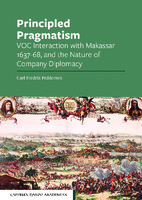Principled Pragmatism: VOC Interaction with Makassar 1637-68 and the Nature of Company Diplomacy
| dc.contributor.author | Fredrik Feddersen, Carl | |
| dc.date.accessioned | 2017-09-01 23:55:55 | |
| dc.date.accessioned | 2018-06-28 15:17:11 | |
| dc.date.accessioned | 2020-04-01T13:24:38Z | |
| dc.date.available | 2020-04-01T13:24:38Z | |
| dc.date.issued | 2017 | |
| dc.identifier | 638070 | |
| dc.identifier | OCN: 1030818957 | en_US |
| dc.identifier.uri | http://library.oapen.org/handle/20.500.12657/31129 | |
| dc.description.abstract | In this study of the Dutch East India Company the author uses the Company’s seventeenth century diplomatic interaction with the trading Sultanate of Macassar, on the southwestern tip of present day Sulawesi, as a case in cross cultural diplomacy. The author argues that the outlook of the Company’s agents both home and overseas was pragmatic, as was the nature of the solutions to the problems they faced. In doing so, the author challenges propositions of Company ethnocentric tunnel vision in its thinking about, and practice of overseas diplomacy. He also run counter with propositions that the communication between Company agents and their Asian friends and foes represented a miscommunication caused by structural cultural barriers. The study is based on analysis of the political language of the Company at the respective levels of operation. | |
| dc.language | English | |
| dc.subject.classification | thema EDItEUR::N History and Archaeology | en_US |
| dc.subject.classification | thema EDItEUR::3 Time period qualifiers::3M c 1500 onwards to present day | en_US |
| dc.subject.other | makasser | |
| dc.subject.other | dutch east india company | |
| dc.subject.other | diplomacy | |
| dc.subject.other | voc | |
| dc.subject.other | Buginese people | |
| dc.subject.other | Cornelis Speelman | |
| dc.subject.other | Maluku Islands | |
| dc.subject.other | South Sulawesi | |
| dc.title | Principled Pragmatism: VOC Interaction with Makassar 1637-68 and the Nature of Company Diplomacy | |
| dc.type | book | |
| oapen.abstract.otherlanguage | I denne studien av Det nederlandsk-ostindiske kompani tilbakeviser forfatteren tidligere påstander om Kompaniets diplomatiske tankemåte og praksis. Gjennom en analyse av den diplomatiske interaksjonen mellom Kompaniet og Sultanatet Makassar (sør på dagens Sulawesi) gjendrives påstander om at et etnosentrisk tunnelsyn formet Kompaniets oversjøisk diplomati. Gjennom en dekoding av Kompaniets politiske språk, slår forfatteren fast at Kompaniet tvert imot fremstod som pragmatisk og primært la til grunn vurderinger av lokale maktpolitiske forhold i sin interaksjon med de lokale makthaverne. | |
| oapen.identifier.doi | 10.23865/noasp.23 | |
| oapen.relation.isPublishedBy | bf7b42a4-6892-42e3-aaf8-8f32c8470a8b | |
| oapen.relation.isFundedBy | e986e1bf-97d2-46f6-910c-91340657ef7b | |
| oapen.relation.isbn | 9788202566609 | |
| oapen.pages | 375 | |
| oapen.place.publication | Oslo | |
| oapen.remark.public | Relevant Wikipedia pages: Buginese people - https://en.wikipedia.org/wiki/Buginese_people; Cornelis Speelman - https://en.wikipedia.org/wiki/Cornelis_Speelman; Diplomacy - https://en.wikipedia.org/wiki/Diplomacy; Dutch East India Company - https://en.wikipedia.org/wiki/Dutch_East_India_Company; Dutch language - https://en.wikipedia.org/wiki/Dutch_language; Makassar - https://en.wikipedia.org/wiki/Makassar; Makassarese language - https://en.wikipedia.org/wiki/Makassarese_language; Maluku Islands - https://en.wikipedia.org/wiki/Maluku_Islands; South Sulawesi - https://en.wikipedia.org/wiki/South_Sulawesi | |
| oapen.identifier.ocn | 1030818957 |

